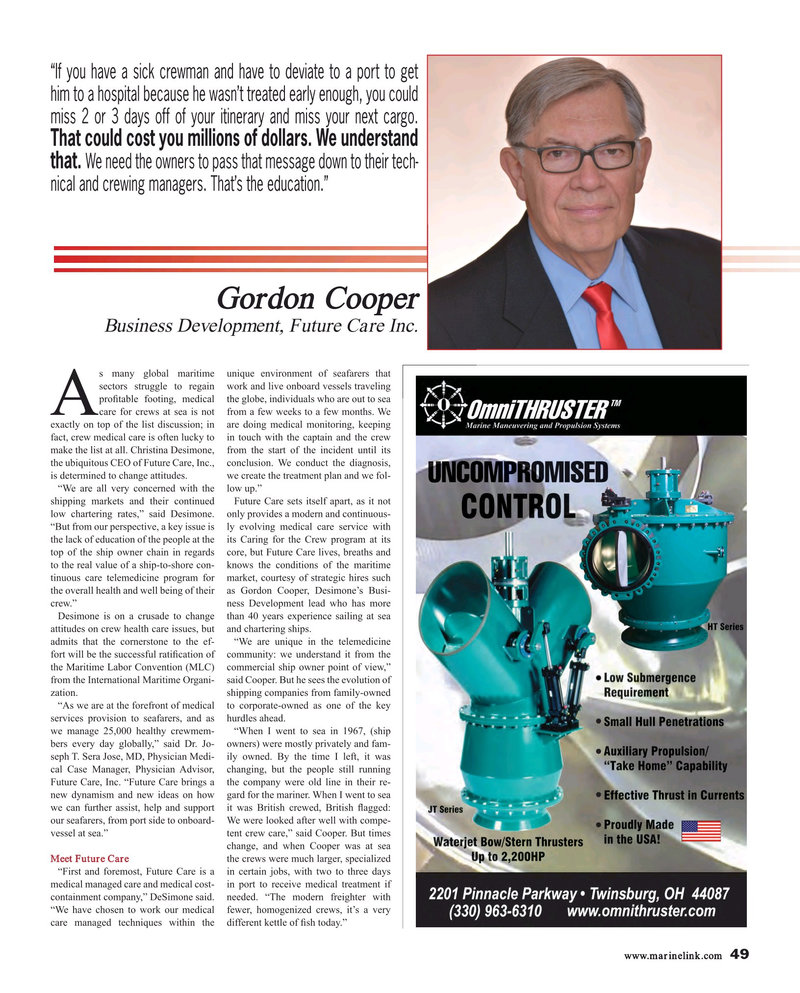
Page 49: of Maritime Reporter Magazine (April 2017)
The Offshore Annual
Read this page in Pdf, Flash or Html5 edition of April 2017 Maritime Reporter Magazine
“If you have a sick crewman and have to deviate to a port to get him to a hospital because he wasn’t treated early enough, you could miss 2 or 3 days off of your itinerary and miss your next cargo.
That could cost you millions of dollars. We understand
We need the owners to pass that message down to their tech- that. nical and crewing managers. That’s the education.”
Gordon Cooper
Business Development, Future Care Inc.
s many global maritime unique environment of seafarers that s many global maritime unique environment of seafarers that sectors struggle to regain work and live onboard vessels traveling sectors struggle to regain work and live onboard vessels traveling th the e gl glob obe e i ind ndi ivid idual ls wh ho are o t ut t to sea medi o?t pr ?t b abl le f footi ting medica cal l pro? table footing, medical the globe, individuals who are out to sea
Acare for crews at sea is not from a few weeks to a few months. We exactly on top of the list discussion; in are doing medical monitoring, keeping fact, crew medical care is often lucky to in touch with the captain and the crew make the list at all. Christina Desimone, from the start of the incident until its the ubiquitous CEO of Future Care, Inc., conclusion. We conduct the diagnosis, is determined to change attitudes. we create the treatment plan and we fol- “We are all very concerned with the low up.” shipping markets and their continued Future Care sets itself apart, as it not low chartering rates,” said Desimone. only provides a modern and continuous- “But from our perspective, a key issue is ly evolving medical care service with the lack of education of the people at the its Caring for the Crew program at its top of the ship owner chain in regards core, but Future Care lives, breaths and to the real value of a ship-to-shore con- knows the conditions of the maritime tinuous care telemedicine program for market, courtesy of strategic hires such the overall health and well being of their as Gordon Cooper, Desimone’s Busi- crew.” ness Development lead who has more
Desimone is on a crusade to change than 40 years experience sailing at sea attitudes on crew health care issues, but and chartering ships.
admits that the cornerstone to the ef- “We are unique in the telemedicine fort will be the successful rati? cation of community: we understand it from the the Maritime Labor Convention (MLC) commercial ship owner point of view,” from the International Maritime Organi- said Cooper. But he sees the evolution of zation. shipping companies from family-owned “As we are at the forefront of medical to corporate-owned as one of the key services provision to seafarers, and as hurdles ahead.
we manage 25,000 healthy crewmem- “When I went to sea in 1967, (ship bers every day globally,” said Dr. Jo- owners) were mostly privately and fam- seph T. Sera Jose, MD, Physician Medi- ily owned. By the time I left, it was cal Case Manager, Physician Advisor, changing, but the people still running
Future Care, Inc. “Future Care brings a the company were old line in their re- new dynamism and new ideas on how gard for the mariner. When I went to sea we can further assist, help and support it was British crewed, British ? agged: our seafarers, from port side to onboard- We were looked after well with compe- vessel at sea.” tent crew care,” said Cooper. But times change, and when Cooper was at sea
Meet Future Care the crews were much larger, specialized “First and foremost, Future Care is a in certain jobs, with two to three days medical managed care and medical cost- in port to receive medical treatment if containment company,” DeSimone said. needed. “The modern freighter with “We have chosen to work our medical fewer, homogenized crews, it’s a very care managed techniques within the different kettle of ? sh today.” www.marinelink.com 49
MR #4 (42-49).indd 49 MR #4 (42-49).indd 49 4/5/2017 12:21:30 PM4/5/2017 12:21:30 PM

 48
48

 50
50
